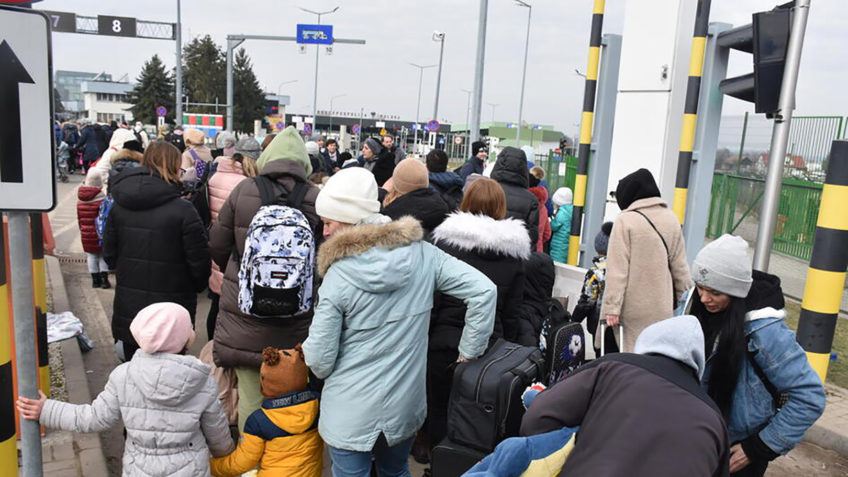
Aid agencies have lost moral and financial support, compromising structures essential to the vital work they do, writes Kelly T. Clements
Classes held under trees, overcrowded basic health units, long walks to reach clean water and the threatening shadow of sexual violence. These were just some of the deprivations recently reported by refugees on Chad’s remote eastern border with Sudan.
Since armed conflict erupted in Sudan in 2023, more than 8.2 million people have been forced to flee their homes, seeking safety wherever they can find it, inside or outside the country.
Most of the refugees who arrived in this arid region — nearly half a million people — would not be alive today without the United Nations, its donors and its partners. Yet, as the world shifts focus, financial and moral support for UN humanitarian agencies, and consequently for the millions of refugees, is dwindling.
Some argue that the UN should be abolished, that it makes no difference, that it is broken, bureaucratic and corrupt. Some of this criticism is old, coming from people who never want to see tax dollars spent outside their own neighborhoods or countries. Another part is based on misinformation, driven by reports that wrongly suggest that the UN is encouraging people to head to the US border.
Yet UNHCR (United Nations High Commissioner for Refugees) carries out vital humanitarian work – from Ukraine to Yemen to Darién, providing life-long assistance to millions of the most vulnerable people. Thus, it still offers hope.
Sustaining such a massive global response requires skilled and courageous staff, detailed contextual knowledge of crises, and significant funding. Much of the work is done behind the scenes and is highly specialized. As someone who has been deeply involved in humanitarian responses throughout my career, I am privileged to have an up-close view.
Over the years, humanitarian agencies have made significant progress, often driven by donors and affected people, in improving accountability and transparency. Now, we are better at learning from the business sector and collaborating. We are not resistant to reform.
The UN’s humanitarian work with partners is more crucial and complex than ever – not just in terms of saving lives, but also in stabilizing communities and countries. And what we do in Chad (Central Africa) matters to those in Chicago (USA), Copenhagen (Denmark) or Canberra (Australia), even if it seems distant.
For example, within days of the start of the conflict in Sudan, UNHCR and its partners were mobilizing at the borders, finding paths. UN logistics have developed over time and currently surpass the capabilities of the private sector and state agencies to reach those in need — whether through the UN Humanitarian Air Service or trucks and ships with supplies from warehouses in the United Nations. hubs regional.
The work is complex: solutions require time, planning, local agreements, negotiating access, acquiring aid and stretching budgets. Furthermore, logistics are expensive, as remote areas are sometimes only accessible by air, and Sudan has 7,000 km of borders.
Even in the midst of political turmoil, the work continues. In Ukraine, UNHCR provides money, housing and relief items. In Afghanistan, 29 of 34 provinces were reached in March with protection, shelter kits and winter essentials for women and children. UN agencies specializing in refugees, food, health and children work through local organizations, using structures and relationships built over decades to support host communities.
FINANCING PERSPECTIVE
Humanitarian work can also be extremely dangerous and stressful, aid workers make enormous sacrifices – away from their families and working in dangerous conditions that can shorten their life expectancy. UNHCR staff have suffered more than 450 security incidents in 2023. For sister agencies, the losses could be even greater.
Amid these numbers, the agency’s financing model is deteriorating. In 2023, UNHCR was only able to raise half of what it needed for planned basic programs. Extremely difficult decisions were faced to meet the greatest demand ever faced by the commissariat.
The outlook for 2024 is even bleaker, with costs rising everywhere. Therefore, we were forced to make cuts:
- in our own people;
- in the cash assistance offered to Syrian refugees in Jordan;
- in feminine hygiene kits in Uganda;
- on protection monitors in the Democratic Republic of Congo.
The human cost is immediate.
While most funding currently comes from the US and the European Union, we are trying to diversify to include the private sector and other parts of the world. But this transition takes time.
For those who argue that charity begins at home, there is one more hard-hitting lesson to be learned from Chad: if we can’t make it easier for people to live and become more self-sufficient where they are, they will move.
At the Sudanese border, Mohammed, a 27-year-old refugee, married with 2 children, told me he planned to make the dangerous crossing to Europe. “What is there for me here?“, He asked. I found myself struggling to respond.
A proper response to Mohammed will take time and effort. We need new actors, investors, financing models and approaches to create the conditions that will allow people to rebuild themselves when they are uprooted. And, for all this to be done, the UN needs support.
If the organization is deprived of resources, these structures will disappear. And once they’re gone, they won’t come back.
Source: https://www.poder360.com.br/opiniao/privar-a-onu-de-recursos-causara-danos-irreversiveis/

